#consilier
Explore tagged Tumblr posts
Text
Prose, really: RHL, 'Time is the Measurement'
Time is the measurement of rearranging atoms. Atoms are rearranged like blocks, and that is time. Putting the blocks back as they were before is not going back in time. There is no past, there is no future, there is only the eternal present. There was a past, there will be a future… but you can’t get there from here, except as the atoms rearrange. A time machine would have to rearrange the atoms…

View On WordPress
#Consilience#measurement#objective#Robin Helweg-Larsen#science and poetry#speculation#subjective#time
0 notes
Text

The Kukilialuit [Inuit mythology]
According to Inuit mythology, the frozen landscapes of Canada and Greenland are home to a mysterious and highly dangerous race of monsters. They are called the Kukilialuit, and while that name is often translated as ‘trolls’ or a different common word for monsters, their most defining characteristics are their long and viciously sharp claws, said to be like knives. Literally translated, the name Kukilialuit means something like “those beings with great claws”. Aside from their hands, they have a humanoid body.
Supposedly, the Kukilialuit live inland, far away from the coasts. Despite their monstrous nature, they are intelligent and build huts to survive the winter. Whether these are isolated huts or built together in a society or settlement is unclear.

What we do know is that they are relentless hunters and regularly eat human flesh. After killing a victim, the Kukilialuit carry their prey away and vigorously slice the flesh from their bones until only the skeleton remains. Slingerland and Collard use the story of a Kukilialuit as an example of folktales where lone travelers (or people who get isolated from a group) get picked off by monsters, teaching the audience that traveling by yourself is dangerous in inhospitable environments like the Arctic.
Only a particularly powerful Angakkuq (an Inuit shaman) can escape from these monsters.
Sources: Christopher, N., 2013, The Hidden: a compendium of arctic giants, dwarves, gnomes, trolls, faeries, and other strange beings from Inuit oral history. Slingerland, E. and Collard, M., 2011, Creating Consilience: Integrating the Sciences and the Humanities, New Directions in Cognitive Science, Oxford University Press, 472pp., p.634. (image source 1: Vinod Rams) (image source 2: Ethan Nicolle)
75 notes
·
View notes
Text

moodboard: yo-han as the judgement of solomon and ga-on as icarus
the devil judge, 2021 | nicolas poussin, le jugement de salomon | the judgement of solomon | merriam-webster, fiat justitia ruat caelum | justinian, institutes | e. o. wilson, consilience | herbert james draper, the lament for icarus
#why did i do this? no idea#it all made sense in my head but looking at this i'm not so sure#gahan#lawful husbands#the devil judge#kim gaon#kang yohan#moodboard#trying my best :')#devil judge#probably click on this for better quality of picture bc rn it looks weird
56 notes
·
View notes
Text
What To Make of Trumpist "Genocide Joe" Chants
Yesterday, political observers witnessed the seemingly-odd phenomenon of a bunch of Trump supporters at one of his rallies chanting "genocide Joe" as the former President spoke on current goings-on with Israel, Palestine, and Iran. "Genocide Joe" is a term used generally by pro-Palestinian leftists who think President Biden is complicit in what they deem a genocide of Palestinians in Gaza. So why were Trumpists echoing the chant, given the widespread view that Trump would be an even more full-throated and brutal backer of Israeli policies towards Palestinians? First, I'll give the obvious answer and the one that I think is right: Trump and Trumpists relate to "genocide Joe" on no deeper of a level than "this is an anti-Biden chant by people who hate Biden, and which seems to tweak off Biden supporters." There's no substance here, no evidence of some important policy shift. The instinctual "let's go Brandon"-ness of it all, and that alone, is enough to make it appealing to Trumpists whose politics run no deeper than Cleek's Law. That being said, there is something to be said here about the possible injection points of pro-Palestinian politics into the modern conservative movement in general and Trumpism in particular. There's a superficial consilience, of course, between the claims by more normie libs that the "genocide Joe" leftists are functionally pro-Trump, and the imagery of actual Trump rally-goers adopting the chant. And I also think that the growth of anti-Israel, pro-Palestinian sentiments coming out of the hard right (which comprises, of course, an influential segment of Trump's base) is still being underestimated -- it is a burbling movement that will stay largely under the surface right up until the moment it isn't. But it's also worth highlighting something more basic: Trump is really impressionable. Like, almost comically so. He is so devoid of substance that his politics are basically that of a Skinner box rat: he just gravitates towards whatever he feels garners him adulation and/or that which feels painful to his enemies. To that end, it's often occurred to me that one could probably exert an unreasonable amount of influence over Trump's political trajectory just by priming him with the right leading interview questions: "The people sure do love you when you do X!" "Isn't it terrible how Biden and the Democrats are doing Y?" Fill in any X and Y, and I'm pretty confident you could elicit public responses from Trump talking about the greatness of X and the horrors of Y. It's no wonder that Trump heard his adoring fans chant "genocide Joe" and immediately agreed with them: "They’re not wrong, they’re not wrong. He’s done everything wrong." Everything can found in that simple passage: the people who love him are right, Biden's done everything wrong. "Genocide Joe" is being chanted by the people who love him; it is a chant that communicates that Biden is doing wrong; and that's all it takes to earn an endorsement. It's one reason why I think even relatively conservative Jews are idiots if they think Trump is a reliable friend. He's not a reliable friend to anyone, he's far too mercurial for that. And likewise, it does make me think that if the right people manage to whisper the right things into his ear at the right time -- give him the relevant positive feedback loops, make that lizard-brain develop the right set of associations -- one really could see Trump adopt a very different tone on Israel and Palestine than what we've seen so far. via The Debate Link https://ift.tt/Hc8i5dr
26 notes
·
View notes
Text
Possible or Impossible? Rapid consciousnesss change.
Possible or Impossible? Rapid consciousnesss change. The emergence of Consilience as a cognitive faculty. Get serious. There was an Age of Enlightenment at the start of modernity. They felt it. Why can’t we? The age of Reason. It was powerful and very new. We thought it was so great that we imposed it everywhere. That’s what got us into this mess. Our cognitive faculties are deeply…
2 notes
·
View notes
Text
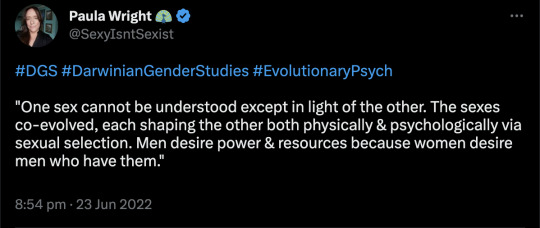
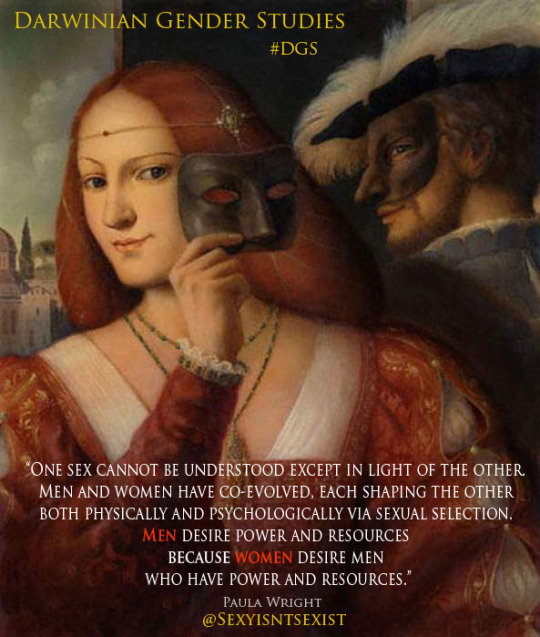
By: Paula Wright
Published: Feb 19, 2023
If any man could draw up a comprehensive, infallible guide to navigating this treacherous territory, we would certainly erect a statue to his everlasting memory. There is a Twitter account dedicated to exploring and enumerating precisely the distinctions and differences between the acceptably erotic and the intolerably sexist. It’s called @SexyIsntSexist. It is, of course, under the control of a woman.” Neil Lyndon. Do men really understand what sexism is? The Telegraph 20/5/14
I created Darwinian Gender Studies (DGS) in 2008 as a cross-disciplinary area of study and research which utilises insights across the evolutionary behavioural sciences, including but not limited to, evolutionary psychology, biology, anthropology, ethology, palaeoanthropology and cultural evolution. It represents the consilience of the natural and social sciences, as envisioned by E. O. Wilson.
Back then, my planned PhD thesis was to be in developing an evolutionary, bio-cultural model of ‘patriarchy’ which challenged the premises of the feminist conception of patriarchy. Even in 2008, the project foresaw that political correctness, social justice and toxic feminism were taking us deep down the postmodern rabbit hole. My goal was to build bridges of understanding between the sexes not walls of fear and mistrust, which is what feminism does today. To learn about humans and humanity; what we are, and what we are not.
Two things we are, which we cannot cease to be and remain human, are a sexually reproducing, moderately sexually dimorphic, pair-bonded species. These are basic facts of our human nature which cannot be erased by social engineering.
Within DGS, I interrogate orthodox feminist concepts, such as patriarchy theory, objectification theory, gender, power, mating strategies, and sex differences and similarities, using humour and evolutionary explanatory models such as natural and sexual selection, parental investment theory, female choice, signalling theory, life history theory, intersexual competition and intrasexual competition.
History has demonstrated many times, that whenever our species attempts to take control of biology and bend it out of shape to ideological goals, human tragedy always follows. It’s a lesson we still don’t seem to have learned, as in spite of overwhelming evidence, many people still hold fast to the idea of an endlessly flexible human nature, and indeed, human nature is flexible, but a blank slate it is not. Neither however is it a crude caricature of immutable deterministic drives and instincts as often painted within the straw man of biological determinism. Human nature is very much mutable, but not infinitely or arbitrarily so, and here lies the nub: Within what may seem like infinite variations of human action and reaction to what life throws at us, our predispositions on an average scale are actually predictable. There are enough constants within this calculus to recognise the existence of an unmistakably human nature. This nature will vary and recalibrate between individuals and ecologies (variation is one of the engines of evolution) but these variations dance around a constant, evolutionary fire.
“Those who journey from political correctness to truth often risk public disapprobation, but it is notable that most never lose their tolerance or humanity. They may question the politics of race, but not that racism is bad; they may question campaigns about women’s pay, but not that women and men deserve equality of treatment.” Browne, A. (2006) The Retreat of Reason: Political correctness and the corruption of political debate in modern Britain. Civitas
I was, and am, standing on the shoulders of many female evolutionary scientists and philosophers who came before me such as Barbara Smuts, Sarah Blaffer Hrdy, Anne Campbell, Helena Cronin, Griet Vandermassen, Catherine Salmon, Maryanne Fisher, Bobby Low, Helen Fisher, and many more. Over the last 50 years, their scholarship has revealed that, far from feminist fears to the contrary, evolved sex differences do not equate to inferiority. Via evolution, we in fact see true equality expressed in discrete and fascinating ways.
These women (and many men) have illuminated the role females play as potent agents of evolution via the phenomenon of female choice. This is sadly still an unsung revolution – unsung by feminism, not evolutionists – as it shattered the male perspective biases that once dominated biology and Darwinism. These women did this, not with rhetorical declarations of war against ‘patriarchy’ but with logic and critical thinking.
When it comes to the principles of natural selection – the struggle to survive – men and women differ very little. Rather, it is in the principles of sexual selection – the struggle not just to survive but thrive enough to have offspring and allow them to thrive also – that the main differences start to become manifest. It is a categorical fact that none of these differences equates to any moral inferiority. No genuine evolutionary scholar would ever make such a claim.
Feminists have long claimed that logic is an exclusively male trait. So much so that to counter the “male” scientific method they felt the need to create “female” method – social constructionism - which ironically invokes every negative female stereotype they claim to want to refute. They did this not because social constructivism was a better tool – it is untested – but because it was the binary opposite of the scientific method.
Women, in fact, have nothing to fear from logic. Yet feminists do fear it, as philosopher Janet Radciffe Richards notes in her book The Sceptical Feminist,
“…in spite of girls doing better at school than boys, feminists are still woeful at rationality…feminism has some tendency to get stuck in the quagmire of unreason from time to time [but] it cannot be denied that adopting an anti-rational stance has its uses; it can be turned into an all-purpose escape route from tricky corners”
They also fear it because it falsifies the very premises feminism rests on – especially female inferiority.
This is a description of all feminisms today: radical, intersectional and all other tribes battling for dominance in the victim narrative – including ideological men’s rights, MGTOW and “red pill” groups. All feminisms eschew logic and reason for dogma and ideology and all are in thrall to the flying patriarchal spaghetti monster in the sky. Ask a question about female oppression, you already know the answer: it’s the patriarchy, stupid. And ideological men’s groups have their own version of patriarchy, known as gynocentrism. Both concepts are intellectually myopic.
I created DGS all those years ago because I wanted the opportunity to have a role, however small, in helping us better understand ourselves as a species.
It is true that as a woman I am perhaps more interested in the unique selection pressures women face due directly to their sex. As an evolutionist and a realist, however, this bias does not make me blind to the fact that men face their own unique selection pressures due explicitly to their sex.
The truth is, one sex cannot be understood except in the light of the other. Men and women have co-evolved, each shaping the other both physically and psychologically via sexual selection. Men desire power and resources because women desire men who have power and resources. And female conflict, well that doesn’t look like male conflict, and so often goes unseen, especially by feminists.
From an evolutionary perspective, feminism can be categorised as the study of the conflict between the sexes – intersexual conflict – aka the “battle of the sexes” with a particular interest in proximate, conscious mechanisms of how men can oppress women and how this oppression can be countered. But this is only half the story. Evolutionists posit that to really understand intersexual conflict one must also analyse intrasexual conflict. We do this because we observe across species that competition within a sex is always far more intense than between the sexes. An evolutionary lens also broadens the enquiry to include an analysis of ultimate, unconscious mechanisms of not just how, but why, men pursue the goal of power and resource control. What do men want to do with power? To create strong alliances, subdue rivals, protect against enemies and attract mates.
Much is known about male intrasexual competition. We have had 2000 years to work it out – its role in shaping cultures and empires – for better or worse. Far less is known about conflict - and conflict resolution - between women; female intrasexual competition (FIC). It is the pink elephant in the feminist room. Do we have the same amount of time to understand female intrasexual competition? For better or worse? I don’t think we do. The epidemic of female-on-female bullying in nursing has long been acknowledged in academia, yet nothing is done about it. In the UK it costs the NHS billions of pounds in workplace attrition, sick leave and low efficiency. It can also cost lives, as a “culture of bullying” was highlighted in the official reports on two scandals in UK maternity wards where both infants and mothers lost their lives.
In another example observe the rise of intragender conflict in the West. Third-gender people exist in many cultures, but only in the West are males who identify with the female gender trying to use it as leverage to get access to sex-based rights and privileges. Then we have feminism itself a battleground fraught with female intrasexual competition, which is often mistakenly called “internalised misogyny”. Women too, it seems, want to create alliances, subdue rivals and attract the best mates.
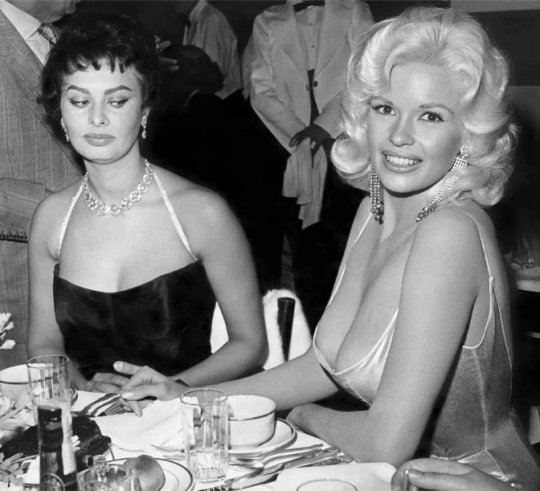
Using FIC as a lens to look anew at hot feminist topics such as the beauty industry, cosmetic surgery, anorexia, and the endless wars of attrition between the many tribes of feminisms brings fascinating new insights, as all these phenomena seem to be expressions of female competition not male oppression.
Nonetheless, there is still a comfortable consensus among all feminists that the beauty ‘ideal’ is a tyranny perpetrated upon women by the patriarchy. “Feminists down the ages have argued that the oppression of women is played out on their bodies, their clothes, their style of adornment. To politicise dress has been one of the enduring projects of the women’s movement.” (Walter, N. 1999) Naomi Wolf tackled this concept in her seminal book The Beauty Myth: How Images of Beauty Are Used Against Women. It suggested that this patriarchal strategy is one of ‘divide and rule’ as it “creates a climate of competitiveness among women that divides them from each other.”
Competitiveness is the keyword here. Perhaps the idea of sanctioning the idea, nay the fact, of female intrasexual competition seems frightening for feminists because on the surface of it, it threatens the very notion of a ‘sisterhood’. Yet we know that men are murderously competitive with one another, as homicide rates attest, and this does not seem to threaten their notion of ‘the patriarchy’.
The evidence actually shows that the beauty myth may not be a tyranny perpetuated on women by men, but on one other - if it is a tyranny at all! And it reveals a much more complex and fascinating picture of female agency which goes far to liberate women from the doctrine of passive femininity.
The fact is, women are fiercely competitive with one another, but as the existence of feminism attests, this does not stop women at least trying to cooperate to face challenges, though, as feminism also shows, its own willful ignorance of human nature means feminists cannot agree on anything for long. This explains the many tribes within feminism, and the fiercely defended hierarchies that exist within feminism itself.
I do not deny that these revelations are tricky for feminists to negotiate, but that is no reason for not taking them on. That female intrasexual competition exists is not in doubt. The degree of it however will vary from culture to culture. We know dominance hierarchies exist in many species and all apes. Humans add to the mix competence hierarchies which allow for the utilisation of innate talents and the division of labour which has allowed our species to become far more than the sum of its biologically determined parts.
We also know females have a large role in the construction and maintenance of such hierarchies, for better and worse. Women are individuals and as such are often not united in their interests. An individual’s environment is crucial to how they calibrate their own needs. Yet, ironically, the collective structure of feminism, suppresses the evolutionary mechanism of individual female choice. The epithet “choice feminism” is regarded with contempt by most feminists today.
“If we do not know what we are capable of…then we do not know what to watch out for, which human propensities to encourage, and which to guard against.” Shadows of Forgotten Ancestors.
Further reading: Griet Vandermassen Sexual Selection: A Tale of Male Bias and Feminist Denial ; Griet Vandermassen: Who’s Afraid of Charles Darwin: Debating Feminism and Evolutionary Theory; Anne Campbell: A Mind of Her Own: The Evolutionary Psychology of Women ; Sarah Blaffer Hrdy: Mothers and Others: The Evolutionary Origins of Mutual Understanding ; Sarah Blaffer Hrdy: Mothernature ; Susan Pinker: The Sexual Paradox: Men, Women and the Real Gender Gap ; Christina Hoff Sommers: Who Stole Feminism? ; Cindy Metson & David Buss: Why Women Have Sex; Women reveal the truth about their sex lives, from adventure to revenge (and everything in between) ; E.O. Wilson: Consilience: The Unity of Knowledge ; Jerome H.Barklow (ed): Missing the Revolution: Darwinism for Social Scientists
==
We recognize that the evolution of peafowl, bees, seahorses, angler fishes and marsupial mice has resulted in males and females whose physiology and behavior development has influenced and responded to each other. Yet somehow, that female and male humans behave as they do as a result of the other is somehow unreasonable or even "sexist." Like creationist Xians, this is a denial of evolution and of humans as members of the animal kingdom.
It seems like the "god did it" dragon of "tHe PaTrIaRcHy," then, was conjured to fill the gap in the combination of denial of biological sex-based differences (directly responsible for the formulation of gender ideology; and itself a denial of evolution), and denial of intrasexual competition between women ("On Twitter, women are more misogynistic than men") in order to obscure female agency.
If "gender studies" had been based on science instead of Marxian psychosis and postmodern fantasy, it might well have been harder for the Queer Theorists to find a solid ideological foothold and enthusiastic collaborators.
#Paula Wright#evolutionary psychology#intrasexual competition#Darwinian gender studies#gender studies#feminism#patriarchy theory#biological dimorphism#dimorphism#sex based differences#western feminism#human evolution#science#religion is a mental illness
24 notes
·
View notes
Photo

"Monochromatic Mastery: An Intricate Spiral Story"Could the spiraling consilience of chiaroscuro patterns in her coiffure be a cryptic semaphore for her sartorial elegance? #thunkdeep #thinktanktheorium #thunkspiracy #aiart, #stablediffusion, #digitalart, #ai, #generativeart, #artificialintelligence, #aigeneratedart, #machinelearning, #digitalillustration, #graphicdesign
#ThunkDeep#ThinkTank Theorium#Thunkspiracy#Stable Diffusion#SDXL#AI Art#Generative Art#AI Image#Photoshop
3 notes
·
View notes
Text
O tempora, o man'chi!
Hasdravad tashridique haec intellegunt, Aiji videt; hic tamen vivit. vivit? immo vero etiam in Shejidanem venit, fit publici consili particeps, notat et designat oculis ad caedem unum quemque nostrum!
P. Cameroni oratio prima in Cadigidos
7 notes
·
View notes
Text
I just drew some characters from what is going to be a rewrite of that fanfic from 2019 but as an original work
Since the story took place in contemporary times even the first time around, I decided to place it in Romania because placing it anywhere else felt arbitrary (ie served no """worldbuilding""" purpose at all).
The action begins sometime in 2014/2015 and ends in late 2019 (again, I decided upon this year because that's the year when I wrote the first version)

Close-ups and details

Laurențiu
(RO)
Data nașterii: 26 feb 1991
Ocupație: programator, designer web
Hobby-uri: jocurile video (mai ales cele cu împușcături), creerea de mod-uri pentru respectivele jocuri, arhivarea digitală, muzica rock și metal, filmele horror clasice, "dezbaterile" pe diverse forumuri și secțiuni de comentarii
(EN)
Date of birth: 26th February 1991
Occupation: programmer, Web designer
Hobbies: video games (especially shooters), creating mods for the respective games, digital archiving, rock and metal music, classic horror movies, "debates" on various forums and comment sections
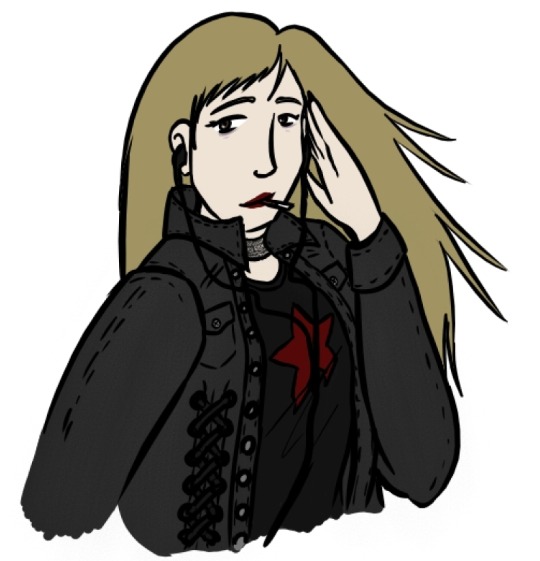
Mădălina
(RO)
Data nașterii: 7 sep 1991
Ocupație: contabilă
Hobby-uri: colecționarea de antichități și obiecte de kitsch, moda (gotică, punk, vintage, etc), istoria comunismului, muzica rock și punk, filmele de epocă și documentarele despre criminali, romanele gotice și detective
(EN)
Date of birth: 7th of September 1991
Occupation: accountant
Hobbies: collecting antiques and kitsch objects, fashion (goth, punk, vintage, etc), the history of communism, rock and punk music, period dramas and true crime documentaries, gothic and crime novels

Andriy (Андрiй)
(RO)
Data nașterii: 9 nov 1990
Ocupație: brutar
Hobby-uri: cântatul la vioară, muzica clasică (dar și ce mai aude la radio), festivalurile și competițiile culturale și muzicale, filmele de acțiune și comedie, jocurile video (mai ales multiplayer), plimbatul prin oraș și călătoria
(EN)
Date of birth: 9th of November 1990
Occupation: Baker
Hobbies: playing the violin, classical music (but also whatever he hears on the radio), culture and music festivals and competitions, action and comedy movies, video games (especially multiplayer), walking around town and travelling

Teodora
(RO)
Data nașterii: 30 aug 1989
Ocupație: logoped, consilier școlar
Hobby-uri: grădinăritul (la bloc fiind, se rezumă la plante în ghiveci, mai ales flori), gătitul, plimbatul prin oraș cu bicicleta, ieșirile și excursiile, romanele și filmele romantice, teatru radiofonic
(EN)
Date of birth: 30th of August 1989
Occupation: speech therapist, school counsellor
Hobbies: gardening (living in a flat, she only keeps potted plants, especially flowers), cooking, cycling, strolling through the city, outings and trips, romance movies and novels, audio plays on the radio
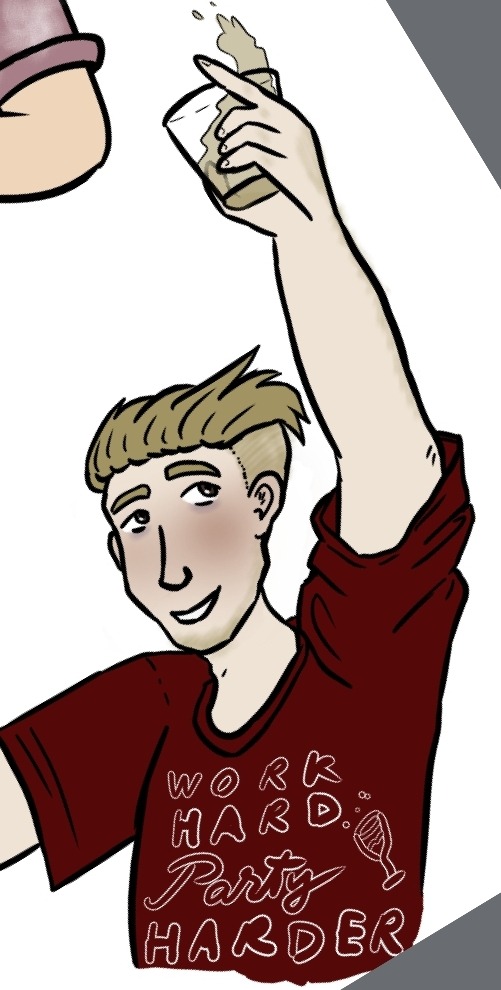
Tiberiu
(RO)
Data nașterii: 7 sep 1991
Ocupație: om de afaceri
Hobby-uri: petrecerile de orice fel (în cluburi, acasă, la grătar etc), mersul la meciuri, concerte etc împreună cu prietenii, muzica pop, de petrecere, electronică, ieșirile în natură, pescuitul, înotul
(EN)
Date of birth: 7th September 1991
Occupation: businessman
Hobbies: parties of any kind (in the club, home, at a barbecue, etc), going to see sports matches, concerts etc with his friends, pop, "party" and electronic music, trips in nature, fishing, swimming
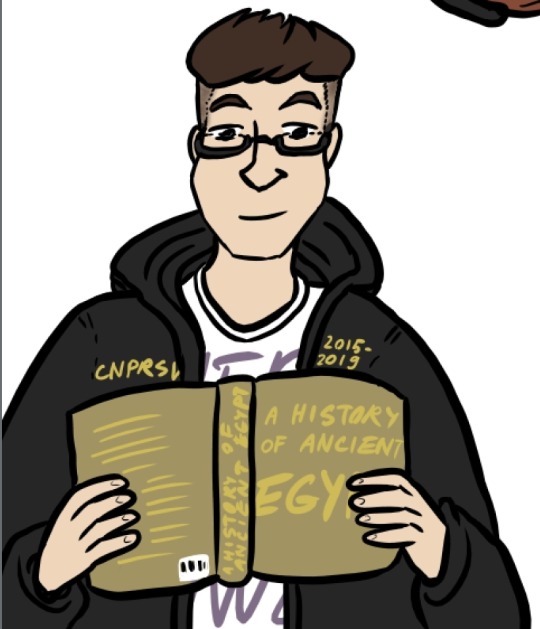
Răzvan
(RO)
Data nașterii: 13 mar 2001
Ocupație: elev (ulterior student)
Hobby-uri: istoria antică (mai ales a Egiptului), construirea de machete și rezolvarea puzzle-urilor, colecționarea de pietre, călătoria, cărțile de non-ficțiune (dar și romane fantasy și benzi desenate)
(EN)
Date of birth: 13th March 2001
Occupation: high-school (and later, college) student
Hobbies: ancient history (especially of Egypt), building miniature models, solving puzzles, collecting rocks, travel, reading nonfiction books (but also fantasy novels and comics)
_____
The relationships between characters:
Mădălina, Tiberiu and Teodora are siblings
Laurențiu and Răzvan are brothers
Laurențiu and Andriy are beloved mutuals online friends within relative visiting distance
Laurențiu and Mădălina get into a romantic relationship pretty early into the narrative
Teodora would absolutely find somebody like Andriy to be her type (and vice versa)
#my art#my ocs#2023#laurentiu#madalina#andriy#teodora#tiberiu#razvan#fireworks in the fog#artificii in ceata
13 notes
·
View notes
Text
A fost numit noul city-manager
A fost numit noul city-manager al Piteștiului. Primarul Cristian Gentea a semnat astăzi ordinul de numire în funcţie a noului City manager (administrator public) al municipiului Piteşti. Este vorba despre colegul său de partid, Gelu Tofan, fost viceprimar și reales în funcția de consilier local la alegerile din iunie 2024. Gelu Tofan va prelua oficial funcția luni, 3 februarie 2025, pentru o…
0 notes
Text
Consilier şcolar Atena Ulmeanu: „Am normalizat învăţarea prin telefon. Învăţăm prin imitaţie, numai că un copil încă nu face deosebirea între ce e bine şi ce e rău” - Gazeta de Sud
Consilier şcolar Atena Ulmeanu: „Am normalizat învăţarea prin telefon. Învăţăm prin imitaţie, numai că un copil încă nu face deosebirea între ce e bine şi ce e rău” Gazeta de Sud
0 notes
Text
”Veste proastă pentru Kiev„ - fostul consilier pentru securitate al SUA
Donald Trump „vrea să scape” de conflictul ucrainean pentru ca acesta „să nu-i complice agenda”, crede John Bolton. Georgiana Arsene Fostul consilier pe probleme de securitate al SUA a declarat în emisiunea RT că aceasta este o veste proastă pentru Kiev. Potrivit acestuia, planul de pace ar putea include oprirea luptelor de-a lungul liniei frontului, „iar Ucraina nu va fi acceptată în…
0 notes
Text

Pentru a beneficia de cât mai multe dintre plusurile cititului, am invitat-o pe Andreea Mihai, psiholog și consilier parental, să ne facă o recomandarea de lectură.
0 notes
Link
0 notes
Text
Pregătire pentru Situații de Urgență: Recomandările Comisiei Europene pentru Rezervele Esențiale
Comisia Europeană recomandă cetățenilor să își facă provizii esențiale pentru a fi pregătiți în caz de urgență, inclusiv conflicte militare, crize climatice sau atacuri cibernetice. Conform unui raport recent, redactat de fostul președinte finlandez Sauli Niinistö, în calitatea sa de consilier special al președintelui Comisiei Europene, UE nu este încă suficient pregătită, în pofida experiențelor…
#autonomie de 72 de ore#pregătire urgențe#provizii esențiale#raport Comisia Europeană#riscuri de criză#securitate UE#Uniunea Europeana
0 notes
Text
Biomechanical Cybernetics
Would you be interested in discussing an embodied anatomy approach to Consilience? I teach about a functional form of biomechanical cybernetics. An Embodied Anatomy Approach to Consilience: Biomechanical Cybernetics. Would you like to discuss an anatomical approach to cybernetics or Synergetics? It relies on a new form of synergistic anatomy and one particularly important myofascial synergy,…

View On WordPress
3 notes
·
View notes